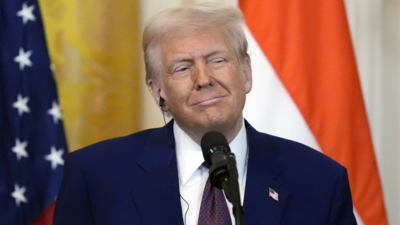
Appellate judges question Trump's authority to impose tariffs (Image credits: AP)
Appellate judges expressed skepticism Thursday over US President Donald Trump’s legal rationale for imposing broad tariffs without congressional approval, raising doubts about his use of the International Emergency Economic Powers Act (IEEPA) to justify the move.During a 99-minute hearing before the US court of appeals for the federal circuit, members of the 11-judge panel repeatedly challenged the Trump administration’s unprecedented interpretation of the 1977 law, which allows the president to seize assets and block financial transactions during a national emergency. The law, originally signed by former President Jimmy Carter, makes no mention of tariffs.“IEEPA doesn’t even mention the word ‘tariffs’ anywhere,” said Circuit Judge Jimmie Reyna as quoted by AP.Attorney Brett Schumate, representing the Trump administration, acknowledged that “no president has ever read IEEPA this way,” but argued that the country’s trade deficit constituted a national emergency requiring such action. He insisted the law grants the president “broad and flexible” authority in emergencies, but claimed Trump was not seeking “unbounded authority.”Chief Circuit Judge Kimberly Moore questioned that logic.
“If the president says there’s a problem with our military readiness and he puts a 20% tax on coffee, that doesn’t seem to necessarily deal with (it),” she said.Neal Katyal, attorney for the plaintiffs, called the administration’s argument a “breathtaking” overreach. “It amounts to saying the president can do whatever he wants, whenever he wants, for as long as he wants, so long as he declares an emergency,” he said.No ruling was issued Thursday, but the case is widely expected to reach the US Supreme Court.The legal battle stems from Trump’s so-called “Liberation Day” tariffs imposed on April 2, which levied new duties on nearly all imports. The lawsuit does not challenge tariffs targeting China or those on steel, aluminum, and autos, many of which remain under former President Joe Biden.In May, a three-judge panel of the US court of international trade ruled that Trump exceeded his authority.
The current appeal seeks to overturn that decision.Trump addressed the case on his Truth Social platform, posting: “If our Country was not able to protect itself by using TARIFFS AGAINST TARIFFS, WE WOULD BE ‘DEAD,’ WITH NO CHANCE OF SURVIVAL OR SUCCESS.”The lawsuit is one of at least seven filed against Trump’s tariff policies, with plaintiffs including 12 US states and several businesses, such as a wine importer and a plumbing supply company.Although the US Constitution gives Congress the power to impose tariffs, decades of delegation have allowed presidents increasing control over trade policy. Trump capitalised on this, raising the average US tariff to over 18%- the highest rate since 1934, according to Yale University’s Budget Lab.

 21 hours ago
5
21 hours ago
5








![35-year-old American moved to Chengdu and lives on $30,000 a year: '[It's] poverty in America, but in China I'm living large'](https://image.cnbcfm.com/api/v1/image/108167583-1751548516689-chinacelia1.jpg?v=1751549197&w=1920&h=1080)

 English (US) ·
English (US) ·